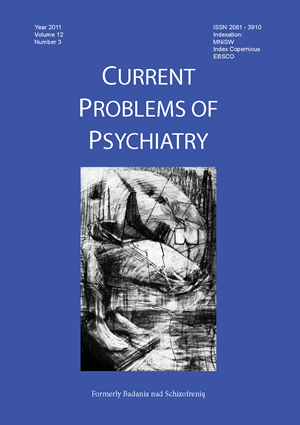Lesch Alcoholism typology – recommended forms of therapy
Keywords:
Lesch typology, alcohol addiction, psychotherapy, pharmacotherapyAbstract
The article presents different forms of psychotherapeutic and pharmacological treatment for people addicted to alcohol and classified according to the Lesch typology.
In the first type, called “the allergy model”, patients are recommended to take part in cognitive-behavioral therapy, as well Anonymous Alcoholics group. As far as type II(named “the fear model”) patients are concerned, the most effective way of treatment are self-help groups thematically focusing on ego–strengthening and workshops devoted to dealing with emotions. Type III, named “the antidepressant model”, regards patients, to whom therapy relevant to the psychiatric disorder should be offered. In many cases cooperation between psychotherapist and psychiatrist in inevitable, as well as with a family or self-help groups gathering people with the same psychiatric disorders, since patients can feel out of place in the group of other addicted. The last one, type IV, called “the conditioning model”, refers to patients, who need a pharmacotherapy, supportive therapy (mostly rather directive), concerned on particular social skills indispensable for life in sobriety. Essential in this case are self-help groups such as Anonymous Alcoholics, organizations devoted to maintain abstinence or hostels. Authors showed the mentioned above forms of psychotherapy and pharmacotherapy that are practically performed in Poland.
References
1. Kaczmarczyk I. Wspólnota Anonimowych Alkoholików w Polsce, Warszawa; Eneteia: 2008.
2. Kogoj D, Lesch O, Walter H, et al. Lesch Alcoholism Typology Medical Treatment and Research. Arch. Psychiatr. Psychother., 2010; 12(4): 37-48.
3. Mellibruda J. Psychologiczna koncepcja mechanizmów uzależnienia. Terapia Uzależnienia i Współuzależnienia, 1999; 1(4): 3-4.
4. Mellibruda J., Sobolewska-Mellibruda Z. Integracyjna psychoterapia uzależnień. Warszawa: Instytut Psychologii Zdrowia PTP; 2006.
5. Woronowicz B.T. Uzależnienia. Geneza, terapia, powrót do zdrowia. Warszawa; Wydawnictwo Edukacyjne PARPAMEDIA: 2009.
6. Trzeźwi, odpowiedzialni, radośni. Fundacja Biura Służby Krajowej Anonimowych alkoholików w Polsce. Wrocław 2009.
7. Lesch O., Walter H. Subtypes of alcoholism and their role in therapy. Alcohol Alcohol., 1996; 31(1): 63-67.
8. Habrat B., Steinbarth-Chmielewska K., Baran-Furaga H. Zaburzenia spowodowane substancjami psychoaktywnymi. W: Bilikiewicz A., Pużyński S., Rybakowski J., Wciórka J. red., Psychiatria. Wrocław: Wydawnictwo Medyczne Urban & Partner; 2002, tom 2, 3: s. 169- 213.
9. Habrat B. Sprawozdanie z VII Kongresu Europejskiego Towarzystwa Biomedycznego Badań nad Alkoholizmem (ESBRA) – Barcelona 16-19.06.1999, Alkoholizm i Narkomania, 1999; 2(35): 301-305.
10. Habrat B. Leczenie wybranych zaburzeń psychicznych i zaburzeń zachowania związanych z przyjmowaniem substancji psychoaktywnych. W: Rzewuska M. red., Leczenie zaburzeń psychicznych. Warszawa: Wydawnictwo Lekarskie PZWL; 2000; 7: s. 212- 219.
11. Chodkiewicz J. Zapobieganie nawrotom w chorobie alkoholowej – przegląd piśmiennictwa, Psychiatria, 2006; 3 (3): 105-111.
12. Cernak L. Deficyty procesów poznawczych u osób uzależnionych od alkoholu. Alkohol a zdrowie – alkohol a mózg, 1998; 14: 80-92.
Downloads
Published
Issue
Section
License
Copyright (c) 2011 Authors

This work is licensed under a Creative Commons Attribution-NonCommercial-NoDerivatives 3.0 Unported License.


